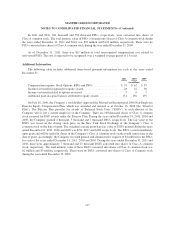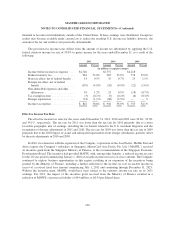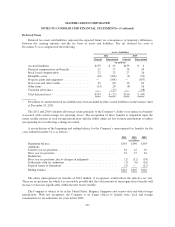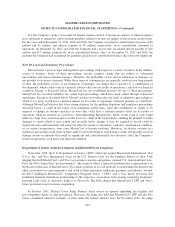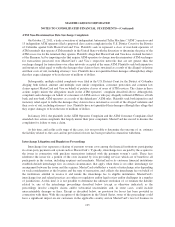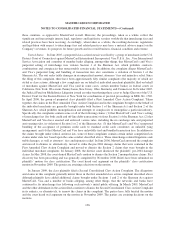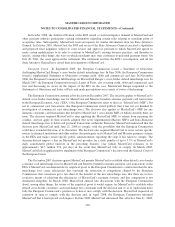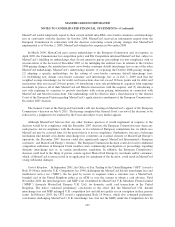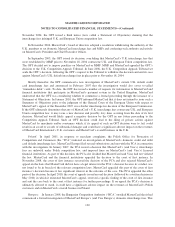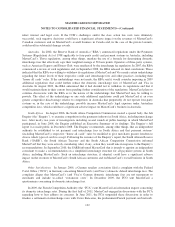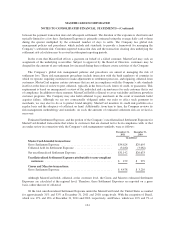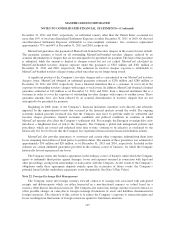MasterCard 2011 Annual Report Download - page 129
Download and view the complete annual report
Please find page 129 of the 2011 MasterCard annual report below. You can navigate through the pages in the report by either clicking on the pages listed below, or by using the keyword search tool below to find specific information within the annual report.MASTERCARD INCORPORATED
NOTES TO CONSOLIDATED FINANCIAL STATEMENTS—(Continued)
ATM Non-Discrimination Rule Surcharge Complaints
On October 12, 2011, a trade association of independent Automated Teller Machine (“ATM”) operators and
13 independent ATM operators filed a proposed class action complaint in the U.S. District Court for the District
of Columbia against both MasterCard and Visa. Plaintiffs seek to represent a class of non-bank operators of
ATM terminals that operate ATM terminals in the United States with the discretion to determine the price of the
ATM access fee for the terminals they operate. Plaintiffs allege that MasterCard and Visa have violated Section 1
of the Sherman Act by imposing rules that require ATM operators to charge non-discriminatory ATM surcharges
for transactions processed over MasterCard’s and Visa’s respective networks that are not greater than the
surcharge charged for transactions over other networks accepted at the same ATM. Plaintiffs seek both injunctive
and monetary relief equal to treble the damages they claim to have sustained as a result of the alleged violations
and their costs of suit, including attorneys’ fees. Plaintiffs have not quantified their damages although they allege
that they expect damages to be in the tens of millions of dollars.
Subsequently, multiple related complaints were filed in the U.S. District Court for the District of Columbia
alleging both federal antitrust and multiple state unfair competition, consumer protection and common law
claims against MasterCard and Visa on behalf of putative classes of users of ATM services. The claims in these
actions largely mirror the allegations made in the ATM operators’ complaint described above, although this
complaint seeks damages on behalf of consumers of ATM services who pay allegedly inflated ATM fees at both
bank and non-bank ATM operators as a result of the defendants’ ATM rules. Plaintiffs seek both injunctive and
monetary relief equal to treble the damages they claim to have sustained as a result of the alleged violations and
their costs of suit, including attorneys’ fees. Plaintiffs have not quantified their damages although they allege that
they expect damages to be in the tens of millions of dollars.
In January 2012, the plaintiffs in the ATM Operators Complaint and the ATM Consumer Complaints filed
amended class action complaints that largely mirror their prior complaints. MasterCard has moved to dismiss the
complaints for failure to state a claim.
At this time, and at this early stage of the cases, it is not possible to determine the outcome of, or, estimate
the liability related to, the cases and no provision for losses has been provided in connection with them.
Interchange Litigation and Regulatory Proceedings
Interchange fees represent a sharing of payment system costs among the financial institutions participating
in a four-party payment card system such as MasterCard’s. Typically, interchange fees are paid by the acquirer to
the issuer in connection with purchase transactions initiated with the payment system’s cards. These fees
reimburse the issuer for a portion of the costs incurred by it in providing services which are of benefit to all
participants in the system, including acquirers and merchants. MasterCard or its customer financial institutions
establish default interchange fees in certain circumstances that apply when there is no other interchange fee
arrangement between the issuer and the acquirer. MasterCard establishes a variety of interchange rates depending
on such considerations as the location and the type of transaction, and collects the interchange fee on behalf of
the institutions entitled to receive it and remits the interchange fee to eligible institutions. MasterCard’s
interchange fees and related practices are subject to regulatory and/or legal review and/or challenges in a number
of jurisdictions. At this time, it is not possible to determine the ultimate resolution of, or estimate the liability
related to, any of the interchange proceedings described below (except as otherwise indicated), as the
proceedings involve complex claims and/or substantial uncertainties and, in some cases, could include
unascertainable damages or fines. Except as described below, no provision for losses has been provided in
connection with them. With the exception of the litigation in the United States, some of the proceedings could
have a significant impact on our customers in the applicable country and on MasterCard’s level of business in
125




